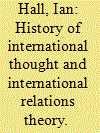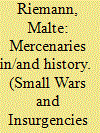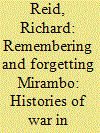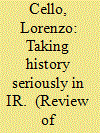| Srl | Item |
| 1 |
ID:
099499


|
|
|
|
|
| Publication |
2010.
|
| Summary/Abstract |
This paper challenges the views in the fields of International Relations and International Law that treat the significance of law in the international system solely on the basis of the contemporary context marked by the increased institutionalization of world politics. Instead of focusing on the relationship between rules and the conduct of actors, we conceptualize the co-constitutive relationship between law and politics, and incorporate the multiple forms of legal-political expression that constitute power relations and dynamics into our analysis. Three dimensions of the co-constitutive relations between Law and Politics are explored: legal forms, legal constraints, and the indeterminacy of law.
|
|
|
|
|
|
|
|
|
|
|
|
|
|
|
|
| 2 |
ID:
155786


|
|
|
|
|
| Summary/Abstract |
Over the past two decades, historians of international thought have markedly improved our understanding of the disciplinary history of International Relations (IR) and its wider intellectual history. During that period, ‘contextualism’ has become a leading approach in the field, as it has been for half a century in the history of political thought. This article argues that while the application of contextualism in IR has improved our understanding of its disciplinary history, its assumptions about the proper relationship between historians and theorists threaten to marginalise the history of international thought within IR. It argues that unless the inherent weaknesses in contextualism are recognised, the progress made in the field will go unrecognised by a discipline that sees little reason to engage with its history. It suggests that historians of international thought adopt an extensively modified version of contextualism that would allow them to rebuild bridges back into IR, especially IR theory.
|
|
|
|
|
|
|
|
|
|
|
|
|
|
|
|
| 3 |
ID:
188313


|
|
|
|
|
| Summary/Abstract |
The history of the mercenary seems little less than the history of organized warfare itself. From the dawn of recorded history to the recent rise of Private Military Companies, mercenaries appear as a historical constant that allows scholars to make grand historical claims about the organisation of force within world history. This article cautions against this view, arguing instead that the analysis of this actor has been compromised by the failure to adequately historicise and contextualize the concept of the mercenary due to the uncritical acceptance that mercenaries are a trans-historical occurrence. Informed by a historicist contextual approach, I show how two foundational characteristics of the mercenary concept, a Westphalian understanding of ‘foreignness’ and a modern account of ‘self-interest’, were absent in the periods preceding the 18th century. I demonstrate this absence through an analysis of ‘mercenaries’ in Ancient Greece and the Middle Ages, exposing how the problematization of these actors within their own historical context displays a radical difference if compared to our contemporary understanding of the mercenary. In doing so this article raises awareness to the historical specificity of this seemingly universal concept and cautions against the uncritical backward projection of this concept into the past.
|
|
|
|
|
|
|
|
|
|
|
|
|
|
|
|
| 4 |
ID:
168217


|
|
|
|
|
| Summary/Abstract |
While the study of organised violence is considered essential to understanding the history of the West, and accordingly imbued with various layers of meaning and remembrance, war is widely regarded as inimical to the modern nation in Africa and stable development more broadly. Using examples drawn from primarily from East Africa, this paper considers the ways in which warfare in the deeper (‘precolonial’) past has been framed and envisioned in recent decades, in particular by governments whose own roots lie in revolutionary armed struggle and who began life as guerrilla movements. While in some cases particular elements of the deeper past were indeed mobilised in pursuit of contemporary political goals, in many other scenarios histories of precolonial violence were beheld as problematic and unworthy of remembrance. This paper highlights the paradox and ambiguity which has attended the memory of key aspects of Africa’s deeper past.
|
|
|
|
|
|
|
|
|
|
|
|
|
|
|
|
| 5 |
ID:
158721


|
|
|
|
|
| Summary/Abstract |
IR scholars have always invoked history as a valuable resource for understanding the present. However, the question of how should we go about investigating and interpreting the past is rarely asked, let alone answered. While most IR approaches are anchored to the attempt to situate oneself outside history – reading the past in terms of the present or in terms of a hypothetical future – this article strives to redress the kind of historical perspective adopted, if at all, by IR scholars. It does so by advancing a distinctive historicist approach that emphasises the importance of understanding past practices and discourses in their own historical and intellectual contexts. In order to substantiate this claim, the article goes on to critically engage with recent calls to historicise intervention in IR, arguing that a historicist mode of analysis represents a corrective to presentism as well as an alternative route into present-day debates.
|
|
|
|
|
|
|
|
|
|
|
|
|
|
|
|